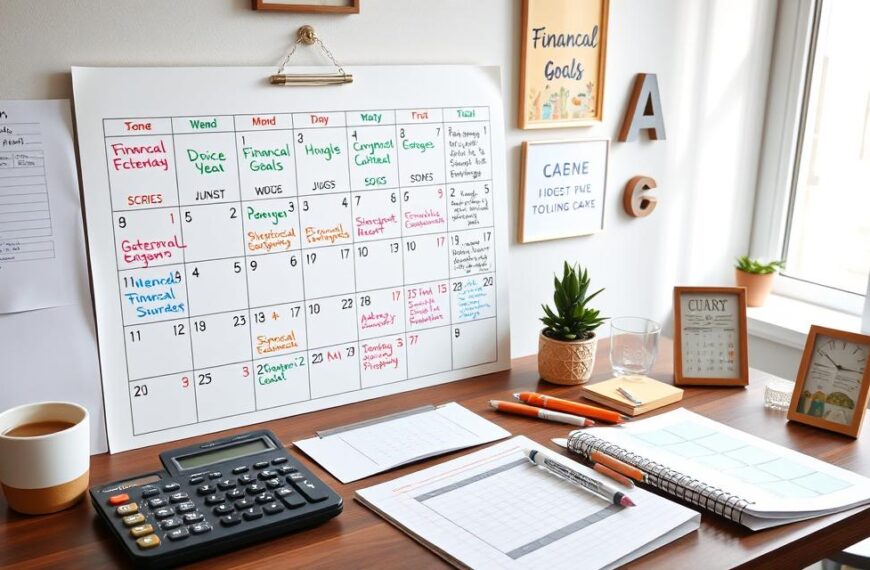A budget is not just a simple financial tool. It’s the foundation of managing personal finance and shaping a long-term financial strategy. By mapping out expected expenses and incomes, it helps individuals, families, and businesses to plan ahead. This planning boosts financial knowledge and understanding of one’s financial standing, key for financial security.
Moreover, a budget leads to a disciplined focus on long-term goals. This is akin to how companies plan financially. They forecast finances and assess potential risks.
Having a budget helps in achieving savings targets and managing risks efficiently. For those aiming for a solid financial future, grasping budgeting’s value is vital. It promotes wise spending and resource use, guiding finance management through life’s phases. Regularly revisiting and updating the budget is important. A well-maintained budget is a continuous tool for reaching financial targets.
The Importance of Budgeting for Financial Security
Budgeting is key for anyone’s financial well-being. It helps you understand your money situation clearly. This includes knowing what comes in and what goes out. You also learn to tell apart fixed costs, like rent, from variable ones, like eating out.
With a full view, you can spot where to save or invest better.
Understanding Your Financial Position
Getting to know your financial status means looking closely at what you earn. This includes salary and any other help you might get. It’s crucial to differentiate between steady costs and those that change.
This knowledge allows for smarter financial choices, leading to stronger security and control over your money.
Creating a Roadmap for Future Expenses
A smart budget acts like a guide for what’s ahead. By saving systematically and allocating money wisely, you set up a stable financial future. This approach keeps track of your spending and safeguards against unexpected expenses.
Revisiting your budget helps keep goals within reach and adapt when needed. It lays a solid base for growth.
| Statistic | Impact |
|---|---|
| Individuals with a monthly budget | 50% more likely to achieve financial goals |
| People sticking to a budget | Reduce debt by 20% within the first year |
| Individuals with emergency funds | 70% less likely to use high-interest loans |
| Budget followers | 30% decrease in financial stress over time |
| Expense tracking through budgeting | 25% reduction in impulsive buying behaviour |
| Consistent budgeting | 15% improvement in financial decision-making |
| Automated saving tool users | 15% average savings increase annually |
A Budget is Essentially a Long-Term Financial Plan
A good budget is like a map for your finances. It helps people set clear financial goals. With a budget, you can focus on what’s important for your money.
Effective budgeting lets you outline your financial future. It makes sure you stick to your financial path.
Defining Long-Term Financial Goals
Knowing your long-term financial aims is crucial. You might want to buy a house, save for when you retire, or pay for school. A budget helps you set goals that are clear and reachable.
With goals in place, you can track your success and tweak things if needed. Having a clear aim helps keep your finances on track.
Aligning Short-Term Actions with Long-Term Ambitions
A budget connects daily spending with bigger financial dreams. By focusing on long-term goals, you make smart choices now. This strategy means you need discipline but leads to big wins financially.
| Long-Term Financial Goals | Short-Term Actions | Impact on Financial Ambitions |
|---|---|---|
| Home Ownership | Saving for a deposit | Building equity and stability |
| Retirement Savings | Contributing to a pension plan | Ensuring a comfortable retirement |
| Educational Expenses | Setting aside funds annually | Providing opportunities for growth |
| Investment Growth | Regular investment deposits | Increasing wealth over time |
How Budgeting Helps in Achieving Financial Goals
Budgeting is key for meeting our financial targets. It helps us keep an eye on our spending, cutting the chance of debt. Plus, it gets us into the habit of saving regularly. Setting up a budget means we’re ready for surprise costs, keeping us stable money-wise for the long haul.
Controlling Spending and Avoiding Debt
A good budget lets us watch and manage our spending. It helps us assign cash to different needs, making it simple to see where our money’s going. Knowing this, we can avoid spending traps. Keeping an eye on our expenses means we’re less likely to end up stretched thin financially.
Facilitating Regular Savings
A budget pushes us to put some money aside regularly. It’s not just about hitting big goals but also adding to our retirement pot or saving for dreams. As we get better at managing our money, we might save more, boosting our financial growth.
Preparing for Emergencies with a Financial Buffer
Having a budget for emergencies is crucial. A solid emergency fund covers living expenses for three to six months. It’s a backup for the unexpected. A smart budget shows how much to save for this, keeping our long-term goals safe.
| Budget Category | Suggested Monthly Amount | Purpose |
|---|---|---|
| Housing | 30% | Rent or mortgage payments |
| Food | 15% | Groceries and dining |
| Transportation | 10% | Public transit or car expenses |
| Savings | 20% | Regular savings and emergency fund |
| Debt Repayment | 15% | Paying off loans or credit cards |
| Discretionary Spending | 10% | Entertainment and personal expenses |
Integrating Budgeting into Long-Term Financial Planning
Bringing budgeting into your long-term financial plans helps improve financial clarity and stability. It’s important to track financial progress to stay focused on your goals. By regularly comparing spendings to the budget, you can smoothly work towards your financial dreams.
Tracking Progress Towards Financial Objectives
Keeping an eye on your financial journey means checking how you’re doing against your goals. This helps show how your spending matches up with your long-term plans. It’s wise to do a financial check-up every few months. This can point out where you might need to cut back to stick to your plan. Useful strategies include:
- Using FP&A software to access and analyse data.
- Applying predictive analytics to spot possible future trends.
- Creating visual tools for faster financial insights.
- Doing a SWOT analysis to know your financial strengths and weaknesses.
Reevaluating and Adjusting Your Financial Plan Regularly
Adapting your financial plan as life and income change is crucial. This flexibility helps you manage changes in your financial life well. Regularly updating your budget and plan is key. This includes:
| Aspect | Importance |
|---|---|
| Financial Environment Analysis | Grasp the economic conditions affecting your finances. |
| Revenue and Expenditure Forecasts | Prepare for upcoming cash needs and control spending. |
| Debt Position Monitoring | Check how debt influences your financial health. |
| Affordability Analysis | Look at living costs and make needed changes. |
| Strategic Adjustments | Make changes for better financial management. |
Conclusion
Setting up a budget is crucial for long-term financial success. It acts as a key guide that helps understand spending habits. It’s vital in reaching financial goals.
Budgeting shines a light on expenses, aiding in smarter decisions on saving and investing. Knowing how to save for emergencies and handle debt wisely is essential. By keeping track of finances and making adjustments, one can protect against surprises and market swings.
In essence, a budget is more than just tracking money; it’s the foundation of financial stability. Seeing budgeting as an ongoing activity helps manage money well. It makes achieving future financial dreams possible.
FAQ
What is the primary purpose of establishing a budget?
The main goal of a budget is to ensure financial security. It helps track spending and plan for the future. With a budget, you can manage expenses, save money, and be ready for the unexpected.
How does budgeting promote financial literacy?
Budgeting boosts your understanding of money matters. It involves checking how much money you make and how you spend it. This helps people grasp their financial situation and how to manage it.
What factors should I consider while creating a budget?
When setting up a budget, think about your fixed and variable costs and your income. Also, consider your short-term and long-term goals and where you can save or invest. This helps in making a plan for your money in the future.
How can I ensure my budget aligns with my financial ambitions?
To match your budget with your financial dreams, set clear goals. Keep an eye on your budget and how you spend. This will guide your everyday choices to reach big future goals.
Why is it important to prepare for emergencies when budgeting?
Setting aside money for emergencies is key. This fund should cover several months of living costs. It acts as a safety net for sudden problems, keeping your long-term finances intact.
How often should I review and adjust my budget?
You should check and tweak your budget often as your life and money change. Staying up-to-date with your budget helps you stick to your goals and adjust to new financial situations.
What are the consequences of not following a budget?
Ignoring your budget can lead to spending too much, piling up debt, and having no savings. This lack of financial control makes it tough to reach future financial goals, putting your financial wellbeing at risk.


















